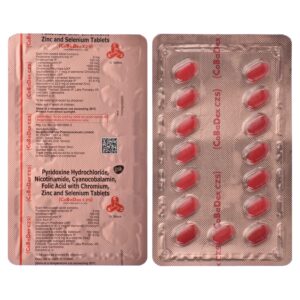B COMPLEX LIVER + VITAMIN B12 I
B Complex Liver: B Complex Liver is a nutritional supplement that contains a combination of B vitamins (B1, B2, B3, B5, B6, B9, and B12), along with liver extract. It is commonly used to support liver function and promote overall well-being.
The mechanism of action of B Complex Liver is primarily related to its B vitamin content. Each B vitamin plays a specific role in the body, including supporting energy production, promoting red blood cell formation, and aiding in the metabolism of proteins, fats, and carbohydrates. These vitamins are essential for the proper functioning of the liver and contribute to its detoxification processes.
The recommended dose of B Complex Liver may vary depending on the individual’s age, health condition, and specific needs. It is typically available in tablet or capsule form, and the usual dosage is one tablet or capsule per day, preferably with a meal. It is important to follow the instructions provided by the manufacturer or consult a healthcare professional for the appropriate dosage.
B Complex Liver is generally well-tolerated when taken as directed. However, some individuals may experience minor side effects, including upset stomach, nausea, or diarrhea. These side effects are usually temporary and subside on their own.
It is important to note that B Complex Liver is a nutritional supplement and should not be used as a substitute for a balanced diet or as a treatment for liver disease or other serious medical conditions. If you have a pre-existing liver condition or are taking any medications, it is advisable to consult a healthcare professional before starting any new supplementation regimen.
Vitamin B12 I: Drug Name: Vitamin B12
Use: Vitamin B12, also known as cobalamin, is a water-soluble vitamin that is essential for various metabolic processes in the body. It plays a crucial role in the formation of red blood cells, DNA synthesis, nerve function, and the metabolism of fats and proteins. Vitamin B12 is used to treat or prevent vitamin B12 deficiency, which can occur due to a poor diet, certain medical conditions, or a lack of intrinsic factor, a protein necessary for the absorption of B12 from the gastrointestinal tract.
Mechanism of Action: Vitamin B12 is a coenzyme that is required for the activity of enzymes involved in various essential biochemical reactions in the body, including the conversion of homocysteine to methionine and the conversion of methylmalonyl-CoA to succinyl-CoA. It is involved in the synthesis of DNA and the formation of myelin, the protective covering of nerves. Vitamin B12 is primarily obtained from dietary sources, and its absorption requires the presence of intrinsic factor in the stomach, which binds to B12 and facilitates its transport across the intestines for absorption.
Dose: The recommended dose of Vitamin B12 varies depending on the individual’s age, medical condition, and the severity of the deficiency. Common dosages include:
– Oral supplementation: Typically taken in dosages ranging from 250 micrograms to 1,000 micrograms per day. In severe cases of vitamin B12 deficiency, higher doses may be necessary.
– Intramuscular injection: In cases where oral supplementation is ineffective or not possible, Vitamin B12 can be administered via intramuscular injection. The recommended dosage is usually 1,000 to 2,000 micrograms every 1-3 months.
It is important to consult with a healthcare professional to determine the appropriate dosage for one’s specific needs.
Side Effects: Vitamin B12 is considered safe for most individuals when taken in recommended dosages. The vitamin is generally well-tolerated and has a low risk of toxicity. However, in some cases, individuals may experience mild side effects such as nausea, diarrhea, or skin rash. Allergic reactions are rare but can occur.
It is important to note that excessive intake of Vitamin B12 through supplementation is unlikely to cause harm, as the excess is usually excreted in urine. However, high doses should be used with caution in individuals with certain medical conditions, such as kidney disease.
It is always advisable to consult a healthcare professional before starting any new medication or supplement, including Vitamin B12, to ensure it is appropriate for one’s specific needs and to discuss potential drug interactions or contraindications.

